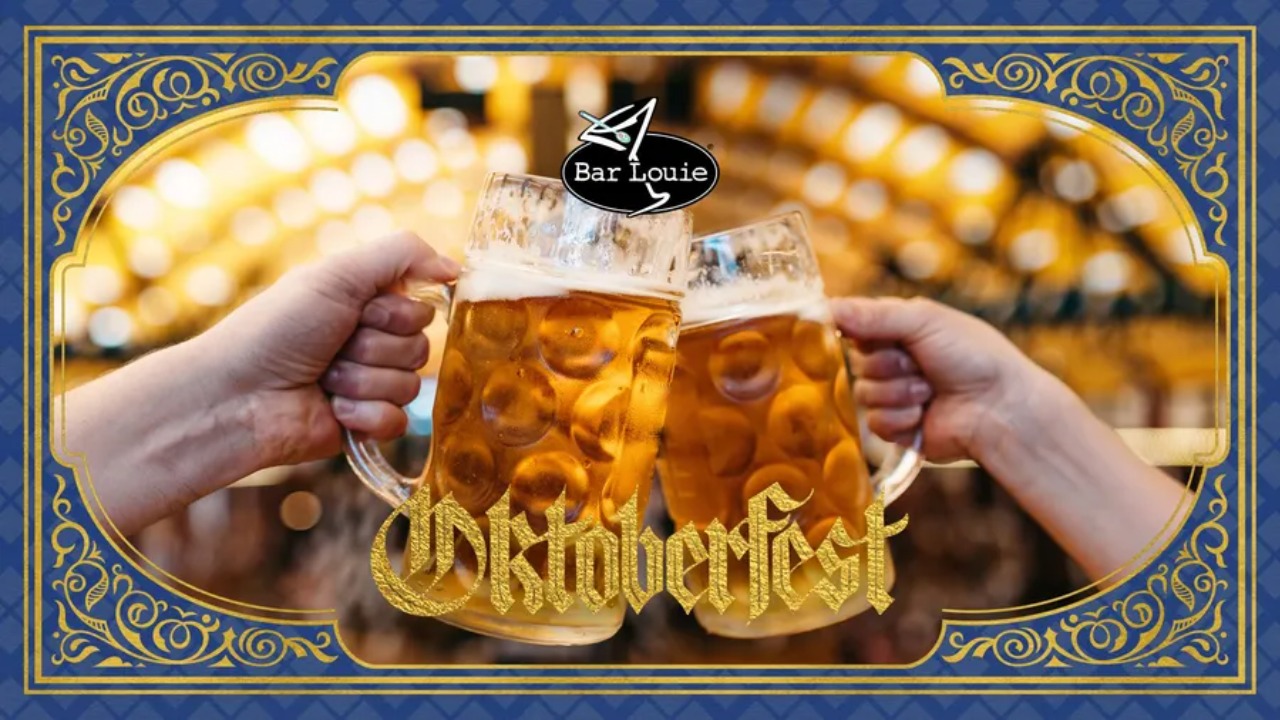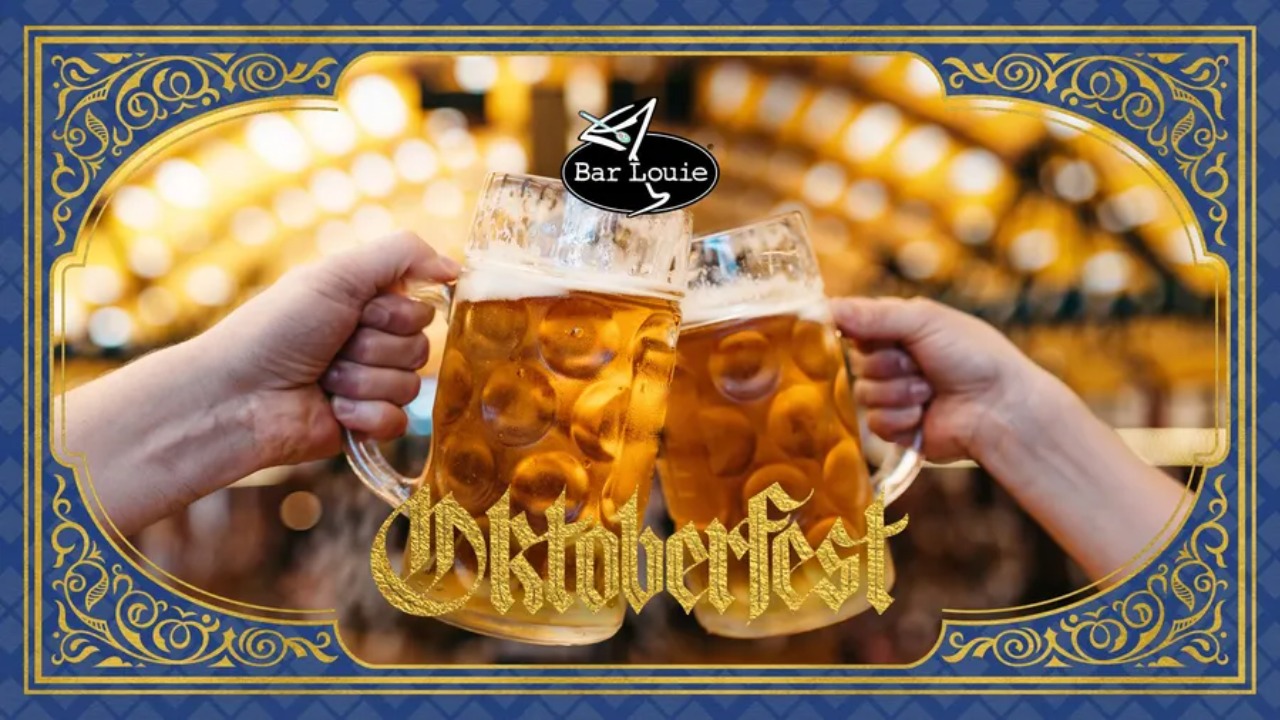
A poster of Oktoberfest. (Photo from Wallpaper.com)
Oktoberfest is an annual festival in Germany known for its contrasting character. On one end, it’s a traditional celebration with rich cultural significance. However, on the opposite extreme, it transforms into a fierce, debaucherous drinking extravaganza, attracting a staggering 6.3 million visitors yearly. This wild revelry resulted in around 7,900 people requiring medical attention, with over 600 cases of alcohol poisoning recorded in 2014.
Inside the festival tents, chaos reigns supreme: lively oompah music blares and the crowd enthusiastically sings along at the top of their lungs. Beer benches groan under the weight of revelers dancing on them, raising their glasses in unison and repeatedly toasting with a hearty “eins, zwo, drei, g’suffa!”
Securing a spot in the festival’s tents is a daunting task. Locals typically book their tables up to a year in advance; even then, it’s a challenge. For tourists, gaining entry to the most sought-after tents can be even more difficult. Savvy tourists arrive promptly around the opening hour at 10 a.m. (9 a.m. on Sundays) to secure a table.
During Oktoberfest, the whole city becomes a bustling hub with inebriated individuals at every turn. This excessive indulgence often leads to conflicts and aggressive behavior. Locals refer to this as “bierleichen” – the term for the many intoxicated individuals passed out on the hill behind the tents.
Alcohol has been an integral part of human history for thousands of years, serving as a source of pleasure, relaxation, and sometimes even peril. Its consumption has been deeply intertwined with cultural, social, and religious practices across the globe.
The Bible, society, and alcohol: A historical and contemporary perspective
https://www.youtube-nocookie.com/embed/MRpA4njHF64
What the Bible REALLY Says About Alcohol
Alcohol plays a complex and multifaceted role in society. Its impact can be positive and negative, depending on cultural, social, and individual factors.
The World Health Organization revealed the following regarding the negative consequences of alcohol consumption (May 2022):
- The unsafe intake of alcohol is a fundamental factor in more than 200 disease and injury conditions.
- The harmful use of alcohol globally results in 3 million deaths every year. This data represents 5.3% of all deaths.
- The consumption of alcohol causes death and disability reasonably early in life. In people aged 20–39 years, approximately 13.5% of total deaths are attributable to alcohol.
- There is a connecting relationship between the injurious use of alcohol and a range of mental and behavioral disorders, and other conditions and injuries.
Alcohol in the Bible: A complex narrative
The presence and impact of alcohol on human civilization are ancient and enduring. The Old Testament, a foundational text in Judeo-Christian tradition, offers a nuanced portrayal of the relationship between alcohol and humanity.
Alcohol as a cultural norm
The Old Testament depicts alcohol as an integral aspect of the culture among God’s people. Various passages illustrate that drinking wine and beer was customary among the ancient Israelites. Melchizedek gifted wine to Abram and Isaac before blessing Jacob, who partook in wine. Additionally, the term “feast,” or mishteh in Hebrew, is derived from “to drink” (shatah) and hints at the customary nature of feasting and drinking.
Alcohol was a staple at meals and parties and even featured in gifts offered at the sanctuary. References to wine as an accompaniment to banquets, provisions, and payment for services rendered abound in the Old Testament. Furthermore, the requirement for on-duty priests and Nazarites to abstain from wine and beer implies that alcohol consumption was the norm rather than the exception.
Exceptions to the rule
While alcohol consumption was widespread, exceptions did exist in the Old Testament. Priests on duty at the sanctuary were explicitly instructed to abstain from alcohol (Leviticus 10:9). Likewise, individuals taking the Nazarite vow or pregnant women were prohibited from consuming any grape products during their vow period.
A particular clan of Israelites, the Rechabites, adhered to an ancestral tradition of not drinking wine, as described in the Book of Jeremiah. During his three-week mourning period, the prophet Daniel refrained from alcohol (Daniel 10:2).
Condemnation of intoxication
The Old Testament does not shy away from condemning the overconsumption of alcohol. Prophets and sages issue strong warnings against intoxication and its adverse effects. Drunkenness is associated with several infamous episodes in the Bible.
Examples are Noah’s nakedness, Lot’s incestuous acts, Nabal’s foolishness, and David’s deceitful actions. While the Old Testament does not explicitly discuss alcoholism as we understand it today, it addresses the broader issue of overconsumption. The Bible emphasizes the need to prevent it, including advocating for total abstention.
The Bible’s take on Booze
A glass of wine. (Photo by Maria das Dores from Pexels)
Drinking alcohol is not a sin
Contrary to the convictions held by many Christians, it is essential to clarify that drinking alcohol is not inherently sinful. The Scriptures do not explicitly condemn or prohibit the consumption of alcohol in moderate amounts.
A compelling case in point is that Jesus himself partook of wine. The religious leaders of his time even accused him of being a drunkard. The Bible reads: “The Son of Man has come eating and drinking, and you say, ‘Look at him! A glutton and a drunkard, a friend of tax collectors and sinners!'” (Luke 7:34).
It’s important to note that while Jesus certainly enjoyed wine, he never indulged to the point of drunkenness. His turning water into wine at a wedding feast (John 2:1-11) and sharing a drink with his friends were commonplace actions.
Additionally, it was customary for Jews to include wine as part of their annual Passover meal, a tradition in which Jesus himself regularly participated. Furthermore, he established the practice of the Lord’s Supper, involving bread and wine (Luke 22:14-20). In light of these facts, it becomes evident that drinking alcohol is not sinful. Otherwise, Jesus would not have engaged in it.
Alcohol: A blessing as depicted in the Bible
The Bible portrays moderate drinking as neutral and celebrates it as a blessing. The Psalmist, for instance, emphasizes that the Lord provides “wine to gladden the heart of man” (Psalm 104:15). It’s worth noting that friends partaking in a meal together often choose to enhance their gatherings by sharing drinks. The Scriptures reference that alcohol can facilitate relaxation, joy, and merriment, all considered blessings from God.
Moreover, alcohol has historically served medicinal purposes. Proverbs 31:6 and 1 Timothy 5:23 recommend “strong drink to the one who is perishing” and “wine to those in bitter distress.” Contemporary medicine now employs more potent treatments. But in the past, alcohol offered relief from suffering, revealing yet another blessing from God. In a world marked by pain and suffering, the Lord has provided solace in times of need.
Finally, God’s promise extends to the future, assuring that wine will be present in the New Heavens and New Earth as we feast with God Himself. Isaiah 25:6 prophesies that “the Lord of hosts will make for all peoples a feast of rich food, a feast of well-aged wine, of rich food full of marrow, of aged wine well refined.” This divine communion, symbolized through sharing a drink, awaits us in heaven. It affirms the concept of alcohol as a divine blessing, as depicted in the Bible.
Drunkenness is a sin
Consuming alcohol is not inherently sinful and is frequently viewed as a gift from God. Nevertheless, the overwhelming consensus in Scripture is that indulging in alcohol can pose spiritual risks. As Christians, we are permitted to partake in alcoholic beverages but unequivocally instructed not to become intoxicated.
The Apostle Paul advises, “And do not get drunk with wine, for that is debauchery, but be filled with the Spirit” (Ephesians 5:18). This divine guidance categorically forbids drunkenness.
For those who might question the meaning of “drunk,” it’s a valid inquiry. Legal standards vary, but in most places, a blood alcohol content (BAC) of 0.08 indicates legal impairment for driving. BAC depends on factors like body weight, drinking quantity, and the time between drinks
Nonetheless, many argue that the 0.08 BAC limit doesn’t necessarily align with the Bible’s definition of drunkenness. The primary focus of Paul’s directive is to be “filled with the Spirit” (Eph. 5:18), emphasizing control. Thus, in Paul’s view, drunkenness implies a loss of control, a criterion that varies from person to person.
The command is straightforward: Avoid getting drunk.
For the glory of God
1 Corinthians 10:31 (Bible verse image from Bible Portal)
“So whether you eat or drink or whatever you do, do it all for the glory of God.” – 1 Corinthians 10:31
Christians are called to live their entire lives in a manner that glorifies God, encompassing every aspect, including eating and drinking. When it comes to alcohol consumption, it enhances our appreciation of the pleasures created by God, particularly in the context of communal fellowship.
However, if our motivation for consuming alcohol is to become intoxicated, to escape from life’s challenges temporarily, or to conform to societal norms, we are risking harm to ourselves. Some Christians have also erred by flaunting their freedom without regard for the beliefs of fellow believers. They do so without considering the potential stumbling blocks for others towards drunkenness (1 Corinthians 8:8-13). In every action we undertake, it is crucial to ensure that it reflects both our love for the Lord and our care for others.
God, in His wisdom, has created alcohol, and the Bible often characterizes it as a gift and a blessing from Him. Nonetheless, like all of God’s gifts, we must exercise discretion and prudence in its use. Regrettably, our sinful nature often leads us to misuse and idolize God’s good gifts. Alcohol is no exception.
Furthermore, scripture emphasizes the dangers of excessive drinking as a recurring theme. Drunkenness is explicitly prohibited for valid reasons. A life characterized by drunkenness dishonors God and inflicts harm upon oneself, one’s family, and friends.
Most significantly, a habitual drunkard is enslaved by alcohol. It reveals a heart devoid of the presence of the Holy Spirit. As Scripture warns, such an individual may not inherit the kingdom of God.
As we consider our attitudes regarding booze, we can draw wisdom from the Bible to promote a healthy and wise approach to alcohol.
More from Crossmap: Exploring the Impact of alcoholism in the Prohibition Era
Republished with permission from Blogs.crossmap.com, featuring inspiring Bible verses about The Bible’s take on Booze: A critical analysis of alcohol today.
